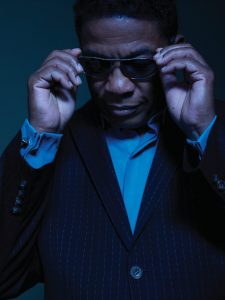
Induction: 2021
Website: Herbie Hancock
Herbie Hancock (by Terri Lyne Carrington)
March 11, 2021
Simply put, Herbie Hancock is the single most influential pianist in jazz since the mid-60’s, after his predecessors Bud Powell and Thelonious Monk. Modern pianists are either influenced by Herbie, or by someone that has been influenced by Herbie. But his accomplishments as a composer are unparalleled as well. He has written jazz standards, funk masterpieces, Grammy nominated pop songs, R&B anthems, dance hits and cult classics – with a couple of film scores and HipHop covers thrown in to boot. Even with 46 albums of varying styles that often evade classification, we never questioned his roots in or his commitment to jazz, rather we admired his curiosity.
From Maiden Voyage and Dolphin Dance to Watermelon Man and Cantaloupe Island, to Chameleon and Rock It, he helped to shape the direction of jazz and contemporary instrumental composition for many decades. His genuine inclination for genre bending brought many fans to jazz who otherwise may have missed the genre completely. As someone that played with him regularly, I can attest to his musical sincerity and his desire to inspire people and push boundaries. He takes the role of artist citizen seriously and is committed to serving humanity.
He studied classical music in his formative years, developing not only masterful technique, but also a broad melodic and harmonic sensibility that informed both his playing and composing, evident in his 1963 recording, Inventions and Dimensions, which also incorporated Afro-Cuban rhythms. He effortlessly accomplishes the not-so-easy task of storytelling with instrumental music, phenomenally matching imagery to melodies. Butterfly and Tell Me a Bedtime Story are palpable examples of this.
The line blurs between composing and improvising with many jazz musicians, but I would have to say even more so with Herbie because of his unique ability to spontaneously re-harmonize while others improvise, often creating the most beautiful song never written. I have experienced his leading others to places unimagined in live performances, where the unforeseen departures vastly improve and redefine the melodies of the improviser. Because of the stark divergence from the original creation and additional musical information Herbie provides, I perceive it as co-composing. Additionally, most of his songwriting and composing over the last four decades has been collaborative, and while being confident, he is also humble enough to yield the reigns in order to work well with others. With his accomplishments, knowledge and abilities, he could very well reject the idea of writing with others, but he is interested in the possibilities that collaboration brings, more than what he can invent on his own.
While listening to music, our focus can vacillate from listening to the composition itself and listening to the performance of the composition. In Herbie’s case, an interesting question could be, “what role does composition play in the enjoyment of the performance?” I’m not entirely sure, but when the man sits down at the piano, whether he is playing a brilliant composition or not, we know we have witnessed greatness beyond category. Correspondingly, many of his compositions can hold their glory, whether being played by beginner, intermediate or advanced musicians. Another sign of greatness.
In later years, there has been a longer time lapse between recordings, making many of us highly anticipative of what is coming next from the Hancock laboratory. And I dare say there may be other composers more prolific than he, but here is where the saying, “quality before quantity,” is genuinely appropriate.
I have a much gratitude for Herbie’s support over the years, and also for his example. His philosophy of playing and composing life, not music, has been transformative to my own development. I would not be the composer I am without his influence and I regularly ask myself, “what would Herbie do here?” realizing that I don’t know, but understanding the importance of the process with such a quest, and appreciating its impact.
In short, Herbie Hancock is a visionary that knows no bounds. He continually paves the way for the next generations, leaving us all inspired and digging deeper into our own imaginations.
Terri Lyne Carrington is a jazz drummer, composer, and producer. Winner of three Grammy Awards, Carrington teaches at Berklee Colleges of Music; in 2020, she was awarded the NEA Jazz Masters Music Fellowship in recognition of her lifetime achievement ad contributions to the art form.
